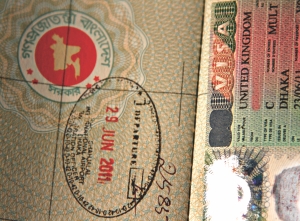| Home - Back Issues - The Team - Contact Us |
 |
| Volume 11 |Issue 10| March 09, 2012 | |
|
|
International
Tough on Dreams Soraya Auer I‘m in between a rock and a hard place,” says Faisal Habib – not his real name – as he stands in a UK visa application queue with 30 other travel-hopeful Bangladeshis. He is clutching a plastic slip with filled-out forms close to his chest. “I couldn't afford to go abroad for my undergraduate studies eight years ago. But now that I can afford to do post-graduate study, the opportunities to get work in the UK are not only limited by the recession-hit job market but by the new visa restrictions,” explains the BUET graduate. The UK's Home Office recently announced a few major changes to visa rules and the one Faisal is referring to is the abolition of the post-study work visa, which will take effect next month. It allowed self-financing international students (non-EU) to recover some of the cost of their courses as well as gain valuable employment experience for two years. When asked why he was still applying to study in the UK now that his plan to work there wouldn't be possible, he looked at me blankly. “I've worked hard to afford this and my family take great pride in saying their son will be the first in the family to study and work in the UK.” Faisal is not alone in his desire to fulfil the Bangladeshi dream of leading a successful life abroad. In the 1970s, changes in immigration laws encouraged a wave of Bangladeshis to come and settle in the UK. Times have changed, however, and the current government's immigration reform hopes to slash overall annual net migration from 250,000 to “tens of thousands.” This would mean many Bangladeshis already in the UK or planning to go in the future will be forced to return when their visas expire. Nazia Ashraf and her husband Mahmud Sagar left Bangladesh over a year ago so that the latter could study to become a chartered accountant in London. Mahmud sold some family land to afford his tuition fees and Nazia quit her teaching job to join her husband. “It's very difficult. If we could stay here longer, after my husband finishes his studies, that would be better for us, but they've closed that opportunity,” explains Nazia. “Most students I know are very unhappy about this change. When my husband finishes his studies, we'll have to go home and find new jobs since we left our previous ones to come to the UK.” She adds, “We would like to try to go somewhere else but according to the law, we have to return home first. If we had known before that the rules would change, maybe we wouldn't have come here for my husband's course.” UK Immigration Minister, Damian Green justified the abolition of the post-study work visa by saying, “In the past, too many students have come to the UK to work rather than study and this abuse must end.” He said talented international students graduating from a university would still have the opportunity to stay on in the UK if it was a skilled job offered by a reputable employer accredited by the UK Border Agency with a salary of £20,000 (Tk 2,582,800) or more, (so no pressure then). “The job market is quite tough here,” says Nazia, who has an MA. “I'm allowed to work, but I'm currently not working in my area of study and London is so expensive. I'm working in a coffee shop.” She adds, “In my opinion, there is something very discriminatory about the system. European students have permission to work unlimited hours but Asian and international students don't. It's really frustrating for those students not to make enough for living costs.” Immigration reform is a topic of hot contention for the Conservative-Lib Dem coalition government, which wants to 'return' and open up jobs for British nationals. Abolishing the post-study work visa, however risks having a knock-on effect on higher education – a sector that has already suffered funding cuts, scrutiny and protests over the past two years. Starting in September, home and EU students will face a 200% hike in tuition fees – a potential deterrent for many students. As a result, universities will increasingly look towards recouping lost home/EU fees by charging high fees to international students. Without the incentive to stay and work in the UK after their studies, prospective Bangladeshi students and their bags of money will consider more favourable systems, such as Canada's. In the long run, this has the potential to financially cripple universities and lower the UK's higher education ranking in the eyes of the world. However, students are not necessarily the worst hit by the recent rule changes. Campaigners argue changes to visa rules for migrant domestic workers will facilitate slavery and trafficking. UK home secretary Theresa May announced last week that the domestic workers reform will prevent foreign cooks, nannies and other staff who come to work in private households from switching employer or staying longer than six months. Campaigners believe the changes would mean any domestic worker suffering abuse would be unlikely to seek help from the authorities, for fear of being deported. “The decision to remove the right to change employer, and therefore remove an important protection from abuse, turns the clock back 15 years to the days when domestic workers were deported for experiencing abuse,” said Jenny Moss, Community Advocate for Kalayaan, an organisation which supports migrant domestic workers. Audrey Guichon of Anti-Slavery International said in a statement, “By tying domestic workers to one employer the government will effectively be licensing slavery, allowing employers to bring workers to the UK without providing those same workers any way of challenging or escaping abuse if it occurs.” She added the situation in Britain would now mirror the “kafala” system across the Middle East where a change of employer means losing the right to residency. May responded to these concerns by acknowledging a potential danger of abusive behaviour under the new legislation, but insisted, “These new UK Visa rules will go some way to preventing domestic work becoming a basis for immigrants to abuse the system in order to remain in Britain.” However, it is not only domestic work visas which are being restricted. More than 40,000 skilled migrants a year (that is two-thirds of the UK's skilled migrants) are to lose their right to settle in Britain after working in the country for five years, unless they are earning £35,000 (Tk 4,523,400) or more a year. The government hopes that introducing this minimum salary threshold will ensure only the “brightest and the best” migrants settle in the UK. Though critics have rightly argued that this will only result in the wealthy and comfortable coming to live and work in Britain permanently.
“This makes no sense in economic terms, will cause big trouble for employers, and is unfair on individual migrants.” While immigration will always be a sensitive topic, there is a distinct feeling of unrealistic double standards with the UK's new changes. 'We expect you to earn X amount, but we won't throw out any Europeans for going on the dole'. Even the US allows low-earners to apply for a Green Card (the right to remain) after a five-year period. Salary is not an indicator of how bright or good you are at your job, nor does it make sense to say five years is a suitable limit to one's employment. Why not three or eight years? Bangladeshis like Faisal, Nazia and Mahmud will probably continue to try to work with the system to make their dreams of working in the UK come true. But for those domestic workers, who may face abuse at the hands of their employer, the opportunity of a lifetime could sadly turn into the stuff of nightmares.
|
Copyright
(R) thedailystar.net 2012 |

 “Ministers accept that our economy needs skilled migrants to come and work at levels below £35,000 a year, but have decided that even if they work hard, pay their taxes, and play by the rules, they will be forced to go home after five years,” said Matt Cavanagh of the thinktank the Institute of Public Policy Research to The Guardian.
“Ministers accept that our economy needs skilled migrants to come and work at levels below £35,000 a year, but have decided that even if they work hard, pay their taxes, and play by the rules, they will be forced to go home after five years,” said Matt Cavanagh of the thinktank the Institute of Public Policy Research to The Guardian.